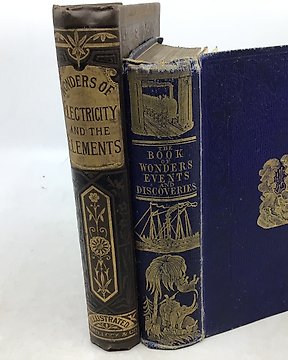
John Timbs - Wonders of Electricity and the elements & The Book of Wonders, events and discoveries - 1850
Nr. 79942263

Nr. 79942263

"Ilias" by Homer - Oxonii et Londini (Oxford and London), Parker et Socios - 1889 edition - 14cmx12cm - condition: good, rebound in half leather binding with some rubbing. Extensively inscribed and annotated by author John Cowper Powys and signed several times by him. This copy used to be his personal copy from his library and was part of a museum collection holding the Powys family's papers and books.
John Cowper Powys (/ˈkuːpər ˈpoʊɪs/ KOO-pər POH-iss; 8 October 1872 – 17 June 1963) was an English philosopher, lecturer, novelist, critic and poet born in Shirley, Derbyshire, where his father was vicar of the parish church in 1871–1879.[1] Powys appeared with a volume of verse in 1896 and a first novel in 1915, but gained success only with his novel Wolf Solent in 1929. He has been seen as a successor to Thomas Hardy, and Wolf Solent, A Glastonbury Romance (1932), Weymouth Sands (1934), and Maiden Castle (1936) have been called his Wessex novels. As with Hardy, landscape is important to his works. So is elemental philosophy in his characters' lives.[2] In 1934 he published an autobiography. His itinerant lectures were a success in England and in 1905–1930 in the United States, where he wrote many of his novels and had several first published. He moved to Dorset, England, in 1934 with a US partner, Phyllis Playter. In 1935 they moved to Corwen, Merionethshire, Wales, where he set two novels, and in 1955 to Blaenau Ffestiniog, where he died in 1963.
The Iliad (/ˈɪliəd/;[1] Ancient Greek: Ἰλιάς, romanized: Iliás, Attic Greek: [iː.li.ás]; "a poem about Ilium (Troy)") is one of two major ancient Greek epic poems attributed to Homer. It is one of the oldest extant works of literature still widely read by modern audiences. As with the Odyssey, the poem is divided into 24 books and was written in dactylic hexameter. It contains 15,693 lines in its most widely accepted version. Set towards the end of the Trojan War, a ten-year siege of the city of Troy by a coalition of Mycenaean Greek states, the poem depicts significant events in the siege's final weeks. In particular, it depicts a fierce quarrel between King Agamemnon and a celebrated warrior, Achilles. It is a central part of the Epic Cycle. The Iliad is often regarded as the first substantial piece of European literature.
So kaufen Sie auf Catawiki
1. Etwas Besonderes entdecken
2. Höchstgebot abgeben
3. Sichere Zahlung durchführen